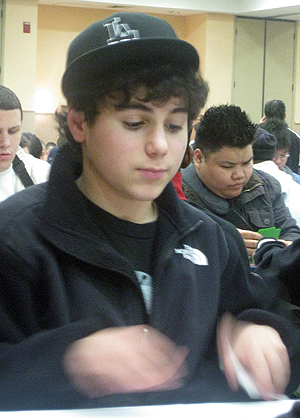Doing interviews at a Shonen Jump is always tricky, because rounds go to time so easily amongst competitive players. It was a stroke of luck that delivered a game loss to Austin Kulman’s opponent this round, giving him an easy match win and a well-deserved respite from the competition. I nabbed him away from the demo tables, striking up a conversation about the big cash prizes in the World of Warcraft TCG (and its minis counterpart) and leveraging that into an impromptu interview outside the tournament hall.
Jason Grabher-Meyer (JDG): “So you drop out of the public eye for the better part of a year, then erupt back into the Day 2 scene in your hometown of Seattle a few months ago. I figured we might lose you for another year after that, but here you are in another Jump. Are you traveling more now?”
 Austin Kulman (AK): “Not really. I’m just here because it’s California and it’s pretty close. Time’s been tight: I wish I could travel more, but high school’s hard. You should play in a Shonen Jump some time!”
Austin Kulman (AK): “Not really. I’m just here because it’s California and it’s pretty close. Time’s been tight: I wish I could travel more, but high school’s hard. You should play in a Shonen Jump some time!”
JDG: Sure. Some day. Moving along! “So what are you running today?”
AK: “I’m playing TeleDAD with Reckless Greed.”
JDG: “Like Calvin Tsang in Detroit?”
AK: “Kind of. There’s about ten cards different. It runs Plaguespreader Zombie and Crush Card Virus. Jarod Roth and Nathan Strand built it. I was testing it for about three weeks to a month, and Jarod and Nathan both won local Regionals. I played it myself and Top 4’d a Regional, so it did really well. It worked really well testing at locals leading up to this weekend too.”
JDG: “Cool. Did you make any metagame reads coming into this tournament?”
AK: “Yeah, Tomas [Mijares] said that there’s a lot of Gladiator Beasts, based off his last Regionals. He said there’s some Lightsworn too but I don’t expect too many to top. I’m expecting a lot of TeleDAD obviously.” It was an interesting read, because it was bang-on: there’s a lot of Gladiator Beast decks seeing play today, many more than I expected.
JDG: “What are you hoping to play against then?”
AK: “Probably just mirror matches. I should be able to out-speed them if they play Solemns. I can swarm, and I sided a lot for anti-meta, I don’t want to chance that matchup.
JDG: “What’s your worst matchup?”
AK: “Probably Lightsworn, cause like, it’s hard, cause they can get lucky, beat you, and you can do nothing. Plants too. It’s really good. Black Garden can fill your entire field with Tokens and then they can stall you out. It’s so hard to play against in general. You have to know when to go all out, and when you do they often have Solemn Judgment or Pollinosis.
JDG: “So what do you think gives you an advantage over the bulk of the field?”
AK: Austin took a moment to consider that, screwing up the corner of his mouth. “Maybe a little skill, but I think I have the edge over standard TeleDAD with Solemns because of my deck. That’s my biggest advantage. If they set one Solemn I can play around it, swarming or using something like Giant Trunade.”
JDG: I launched into my favorite question of the day, asking Austin what he felt was the biggest skill for a duelist in this format.
AK: “Probably knowing when to go all out. Making reads on those face downs. Bluffing isn’t that common right now, so you need to know how to play around the expected cards. Playing defensively, knowing when to play two Stardusts together and stuff with a defensive trap . . . that’s really important. Being the last person to go all out is important, too. It’s pretty easy to see that usually the last person to press wins.”
JDG: And the card advantage question? Did Austin feel that it was less important in this format than others?
AK: “It’s probably less important, because games are so fast and so many things are chainable. It seemed in the past the game was slower, so if you had control, you could keep it and then win from there. Now you can’t keep that control the whole game. You have to get that win when you can. So card advantage is important, but not as much as it has been before.”
Kulman is still just 14 years old, but his range of experience is way beyond that of the average player (not to mention his track record as a one-time US National Champion). Still playing with the Seattle-based Team Fusion, his skills continue to expand as he continues to play with world-class duelists. It’s very possible that he may repeat his Day 2 performance from Seattle.